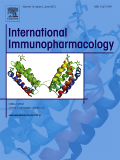
EXERCISE IMMUNOLOGY REVIEW
Scope & Guideline
Elevating Knowledge on Fitness and Immune System Dynamics
Introduction
Aims and Scopes
- Exercise and Immune Function:
The journal investigates how different forms of exercise impact immune system function, including the roles of physical activity in modulating immune responses in both healthy and disease states. - Inflammation and Exercise Interventions:
A significant focus is on the relationship between exercise and inflammation, examining how physical activity can reduce inflammatory markers and improve immune profiles in various populations. - Clinical and Translational Research:
The journal emphasizes research that translates findings from exercise immunology into clinical practice, addressing how exercise can be integrated into rehabilitation and treatment protocols for various health conditions. - Effects of Exercise on Disease States:
There is a consistent exploration of how exercise influences specific diseases, such as cancer, cardiovascular diseases, and metabolic disorders, highlighting the potential therapeutic benefits of physical activity. - Methodological Innovations:
The publication encourages systematic reviews and meta-analyses that provide rigorous assessments of the existing literature, fostering advancements in research methodologies within the field.
Trending and Emerging
- Systematic Reviews and Meta-Analyses:
There is a rising trend in the publication of systematic reviews and meta-analyses, indicating a growing emphasis on synthesizing existing research to provide clearer insights into exercise and immune interactions. - Exercise as a Therapeutic Intervention:
Recent publications increasingly focus on the role of exercise as a therapeutic tool for managing various health conditions, such as cancer and cardiovascular diseases, emphasizing its clinical relevance. - Impact of Exercise on Neuroimmunity:
Emerging research is highlighting the connection between exercise, neuroinflammation, and brain health, suggesting a growing interest in how physical activity can affect neurological conditions. - Integrative Approaches to Immunometabolism:
There is a noticeable increase in studies exploring the intersection of exercise, immune function, and metabolic health, indicating an emerging focus on how physical activity influences metabolic pathways within immune cells. - Personalized Exercise Regimens:
An emerging trend is the exploration of personalized exercise interventions tailored to individual immune responses, suggesting a shift towards more individualized approaches in exercise prescriptions.
Declining or Waning
- Basic Mechanisms of Exercise-Induced Immunity:
There seems to be a decline in publications focused on the fundamental biological mechanisms of how exercise affects immune cells, suggesting a shift towards more applied research and clinical implications. - Animal Models of Exercise Immunology:
Though still relevant, there is a noticeable decrease in studies utilizing animal models to explore exercise immunology, indicating a potential trend towards more human-centric research. - Single Biomarker Studies:
Research focusing solely on individual biomarkers in isolation appears to be less frequent, with a growing preference for comprehensive approaches that analyze multiple biomarkers and their interactions.
Similar Journals

EXERCISE AND SPORT SCIENCES REVIEWS
Unveiling the latest breakthroughs in exercise physiology.Exercise and Sport Sciences Reviews is a premier journal published by Lippincott Williams & Wilkins, dedicated to advancing the field of kinesiology and sports science. With a history dating back to 1973 and an esteemed reputation, this journal maintains a robust impact factor and is recognized in the top quartile for its categories, including Orthopedics and Sports Medicine, Physical Therapy, Sports Therapy and Rehabilitation, and Sports Science. Researchers and professionals in the areas of exercise physiology, rehabilitation, and sports medicine rely on this authoritative source for cutting-edge reviews and meta-analyses that inform clinical practices and improve athletic performance. Although the journal is not Open Access, its substantial contributions to evidence-based practices solidify its importance in guiding future research and policy in the health sciences. The insights shared within its pages are essential for professionals looking to stay at the forefront of their fields, encouraging the advancement of science through comprehensive literature reviews and critical discussions of contemporary issues.

Journal of Inflammation Research
Exploring Innovations in Immunology and Allergy ResearchJournal of Inflammation Research, published by Dove Medical Press Ltd, is a premier open-access journal dedicated to advancing the field of immunology and allergy, with a particular focus on the biological mechanisms underlying inflammation. Since its inception in 2008, this journal has provided a vital platform for researchers to share their findings and foster collaboration within the global scientific community. With an impressive 2023 impact factor placing it in the Q2 category for both Immunology and Immunology and Allergy, the journal has consistently maintained its relevance and high academic standards, ranking #100 in Medicine (Immunology and Allergy) and #118 in Immunology (Immunology and Microbiology) according to Scopus metrics. The E-ISSN 1178-7031 allows for easy access to a plethora of pioneering research articles, reviews, and clinical studies that address contemporary issues in inflammation and immunity. As a leading resource for researchers, professionals, and students alike, Journal of Inflammation Research is committed to facilitating the dissemination of groundbreaking discoveries that contribute to improved therapeutic strategies and health outcomes.

CRITICAL REVIEWS IN IMMUNOLOGY
Connecting Ideas in the World of ImmunologyCRITICAL REVIEWS IN IMMUNOLOGY, published by BEGELL HOUSE INC, is an essential journal in the field of immunology that has been contributing to the scientific discourse since 1980. With its ISSN 1040-8401 and E-ISSN 2162-6472, this journal provides a platform for critical analysis and comprehensive reviews that deepen understanding of immune responses and their implications in health and disease. Although currently categorized in the Q4 quartile for Immunology and Q3 for Immunology and Allergy, the journal's quality research and scholarly contributions are crucial for advancing knowledge within its fields—encompassing various aspects of innate and adaptive immunity. Researchers and professionals in immunology will find invaluable insights, aiding them in their quest for innovation and excellence, as the journal aims to foster interdisciplinary collaboration. While it does not operate on an open-access model, CRITICAL REVIEWS IN IMMUNOLOGY remains a significant resource for those dedicated to pushing the boundaries of immunology, with annual publications expected to last well into 2024 and beyond.

IMMUNOBIOLOGY
Connecting researchers to revolutionize the understanding of immune systems.IMMUNOBIOLOGY is a prestigious academic journal published by Elsevier GmbH that significantly contributes to the fields of hematology and immunology. With its ISSN 0171-2985 and E-ISSN 1878-3279, this journal has been disseminating impactful research since 1979, positioning itself at the forefront of immunological and hematological advances. The journal holds a commendable ranking of Q2 in Hematology and Q3 in both Immunology and Immunology and Allergy, indicating its relevance and influence within the scientific community, as reflected by its Scopus rankings. Although IMMUNOBIOLOGY operates under a subscription model, it remains dedicated to expanding knowledge across disciplines, fostering innovative research, and facilitating connections among researchers, professionals, and students. Situated in Munich, Germany, this journal is continually evolving and aims to remain an essential resource for the latest discoveries and insights in the realms of immunity and blood disorders, ultimately enhancing our understanding of complex biological systems.

IMMUNOLOGICAL REVIEWS
Exploring the Frontiers of Immunology and Allergy Research.IMMUNOLOGICAL REVIEWS is a prestigious journal published by Wiley, renowned for its comprehensive and insightful contributions to the field of immunology. Established in 1969, this journal has become an essential resource for researchers, practitioners, and students interested in the latest advancements in immunological science, specifically focusing on both clinical and basic immunology as well as allergy studies. With an impressive Q1 ranking in both Immunology and Immunology and Allergy categories, and a prominent placement in the Scopus ranks (23/233 and 26/236 in their respective fields), this journal consistently showcases high-quality, peer-reviewed articles that significantly impact our understanding of immune responses. Although Open Access options are not available, the journal remains highly valuable, providing in-depth reviews and perspectives that foster further research and dialogue in immunological sciences. With a commitment to excellence, IMMUNOLOGICAL REVIEWS serves as a vital platform for disseminating knowledge, fostering scientific collaboration, and advancing the field toward innovative healthcare solutions.

JOURNAL OF IMMUNOLOGY
Advancing Immunological FrontiersWelcome to the JOURNAL OF IMMUNOLOGY, a prestigious publication associated with the American Association of Immunologists and dedicated to advancing the field of immunology. With a rich history dating back to 1945, this journal is renowned for its high-impact research, evident in its notable 2023 Q1 rankings in both Immunology and Allergy, as well as its strong positions in Scopus rankings—Rank #68 in Immunology and Allergy and Rank #79 in Immunology and Microbiology. Although it operates on a subscription basis, its commitment to publishing cutting-edge studies ensures that it remains a vital resource for scientists, healthcare professionals, and students alike. As the journal continues to pave the way for innovative research and breakthroughs in immunological science, it facilitates a platform for dialogue and discovery among researchers and practitioners across the globe.

CELLULAR IMMUNOLOGY
Illuminating the Pathways of Immune MechanismsCELLULAR IMMUNOLOGY is a prestigious journal published by Academic Press Inc. Elsevier Science, dedicated to advancing the field of immunology. Established in 1970 and converging ongoing research up to 2024, this journal has carved out a significant niche within the academic community, boasting a notable Q2 ranking in the Immunology category and holding a respectable 67th percentile ranking within Scopus for its contributions to the disciplines of Immunology and Microbiology. The journal serves as a vital platform for disseminating high-quality research, reviews, and methodologies that elucidate the intricacies of cellular immune responses, thereby benefiting researchers, professionals, and students alike. Although it does not offer open access, the journal's impact is evidenced by its comprehensive coverage of pioneering studies and ongoing developments in the immunological sciences, positioning it as an essential resource for those seeking to deepen their understanding and engage with the latest findings in cellular immunology.

BMC IMMUNOLOGY
Fostering Collaboration in Immunological DiscoveriesBMC Immunology is a prominent open-access journal published by BMC that has been at the forefront of immunological research since its inception in 2000. Based in the United Kingdom, this journal aims to advance the understanding of immune system functions and disorders through high-quality, peer-reviewed articles. With an impressive scope encompassing various facets of immunology, BMC Immunology has earned a Q3 ranking in the Immunology category according to the 2023 category quartiles, demonstrating its growing impact and relevance in the scientific community. Researchers and professionals will find valuable insights in its array of published works, spanning both foundational studies and innovative applications. The journal's commitment to open access ensures that cutting-edge research is freely available, fostering collaboration and advancement in the field. For those looking to stay updated on the latest developments in immunology, BMC Immunology stands as an essential resource for researchers, professionals, and students alike.

International Immunopharmacology
Advancing Research at the Intersection of Immunology and PharmacologyInternational Immunopharmacology, published by Elsevier, stands as a prominent journal within the disciplines of immunology and pharmacology. With an ISSN of 1567-5769 and an E-ISSN of 1878-1705, this esteemed journal is based in the Netherlands and features a robust commitment to disseminating high-quality research from its inception in 2001 through 2024. The journal has achieved impressive rankings, securing a Q1 category in Pharmacology and Q2 in both Immunology and Immunology and Allergy as of 2023. With its strategic focus on bridging the gap between immunology and pharmacological applications, International Immunopharmacology attracts a diverse readership, including researchers, healthcare professionals, and students interested in the latest advancements in therapeutic agents and immune system modulation. Furthermore, it offers an open access option, enhancing the accessibility and reach of its invaluable content. As a pivotal resource in the field, this journal not only facilitates the exchange of innovative ideas but also fosters a deeper understanding of the complexities of immunopharmacology in today’s research landscape.

Cellular & Molecular Immunology
Advancing Immunological FrontiersCellular & Molecular Immunology is a prestigious peer-reviewed journal published by the CHIN SOCIETY IMMUNOLOGY. As a leading journal in the fields of immunology and infectious diseases, it proudly holds a Q1 designation across multiple categories, including Immunology, Allergy, and Medicine (Miscellaneous), reflecting its commitment to excellence and impactful research. With an ISSN of 1672-7681 and an E-ISSN of 2042-0226, the journal has been essential reading since its inception in 2004, continuously gathering insights from cutting-edge studies. It ranks impressively within Scopus, with positions in the 7th, 8th, and 9th percentile in relevant categories, establishing it as a cornerstone for researchers, clinicians, and students alike. The journal offers an extensive range of original research articles, reviews, and clinical studies, ensuring that readers stay at the forefront of immunological discovery. Whether you are interested in basic immunology, infectious diseases, or evolving therapies, Cellular & Molecular Immunology serves as an invaluable resource for advancing your knowledge and engagement in this dynamic field.